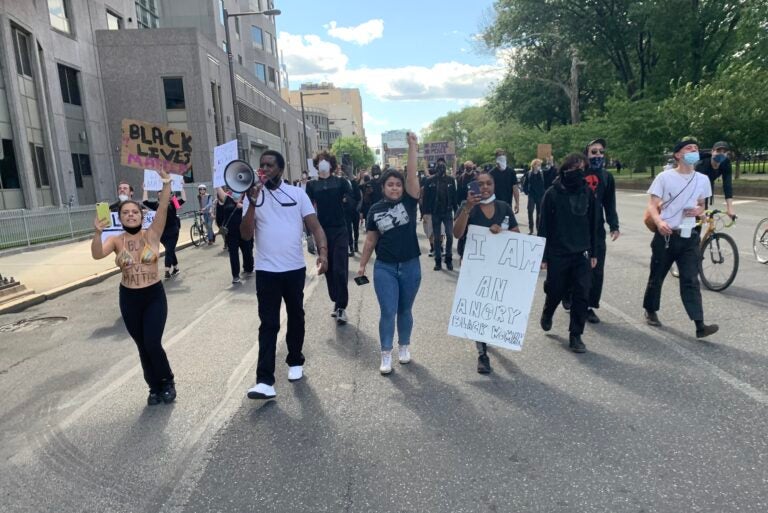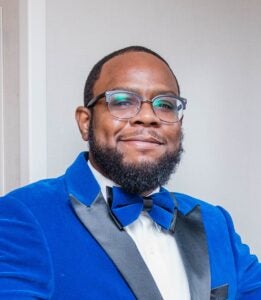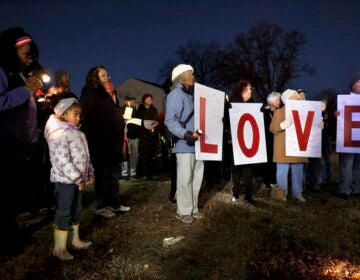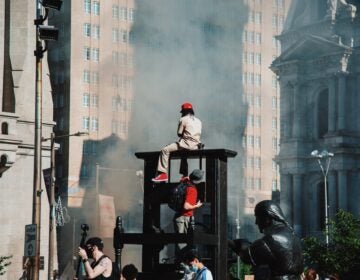‘Imperfect at best, racist at its worst’: America’s facade crumbles as buried voices reaching a deafening pitch
The scream of Black communities has seemingly squelched all other voices in this moment, writes Drexel University graduate student Jarrell Hill.

Protesters march past Philadelphia Police Department headquarters on Sunday, May 31, 2020. (Chris Norris/WHYY)
The hearts of Black communities are bleeding into the street, permanently staining the asphalt. The scream of the bounding pulse of these communities has seemingly squelched all other voices in this moment. And the smoke from the fires in these neighborhoods have forced the nation to discard its rose-colored glasses and see America for what it is: imperfect at best, racist at its worst.
While most are appalled by witnessing cities throughout the nation set ablaze, Black communities have been on fire, figuratively speaking, for decades, without much fanfare.
Agitation, anger, aggression, and fear are symptoms of a systemic disease, one which has subtly festered in the veins of America. For decades, we’ve only treated exacerbated episodes of prejudice and racism, but never have we sought the cure. The civil unrest we see today provides insight into the havoc that racism causes.
Surely, we must condemn individuals who take advantage of pain-stricken times to cause violence and anarchy. For, if we justify unjust actions, it’ll serve as a weakened stitch in our collectively woven fabric of society. That said, society must also acknowledge how we got to this place of sustained unrest.
Failed policies, racism, and a lack of accountability from leaders and our sworn protectors have created conflict and mistrust within Black communities nationwide. The daily threats to our freedoms and liberties have led to volatile tensions, so much so that civil unrest appears to be the new normal.
An acknowledgment of the social and racial disparities that plague oppressed communities – such as Black women and men being significantly more likely than white women and men to be killed by police – is the tip of a spear that can pierce and chip away at inequities. However, without a sustained collective voice and a focused movement, the full sword will remain elusive.
Metaphorically speaking, the year 2020 was supposed to represent a year of vision and clarity for college graduates, like myself. It was supposed to provide direction for leaders who presumably held the moral compass. And although this year hasn’t provided much to be optimistic about, it has lived up to my expectation. Undoubtedly, 2020 has provided vision and clarity, and now we’re all able to clearly see the blemishes beneath the facade of America.
After the mayhem, and underneath the valley of rubble and tide of tears, I’m hopeful that a shared understanding and sense of purpose amongst all races, cultures and ages will emerge.
I’m hopeful that the plight of inner-city Americans and their screams for justice will no longer fall on deaf ears. I’m hopeful that these recent events have inspired young people to relieve our elders of their duty to fight and become the new guard. I’m hopeful as the transition is initiated that our predecessors will be proud that our path starts where they finished. I’m hopeful that bricks from the walls of generational barriers will serve as the rocky path to bridge the social divide.
I am unsure if this is the rebirth of a better America. Though, I am certain that like every birth, America must learn to take a knee and crawl before it can walk in unity.

Jarrell Hill resides in Philadelphia, Pennsylvania with his wife and daughter. He graduated from Mansfield University of Pennsylvania with Cum Laude honors in 2009 and is currently a graduate student at Drexel University in pursuit to become a Family Nurse Practitioner.
WHYY is your source for fact-based, in-depth journalism and information. As a nonprofit organization, we rely on financial support from readers like you. Please give today.





